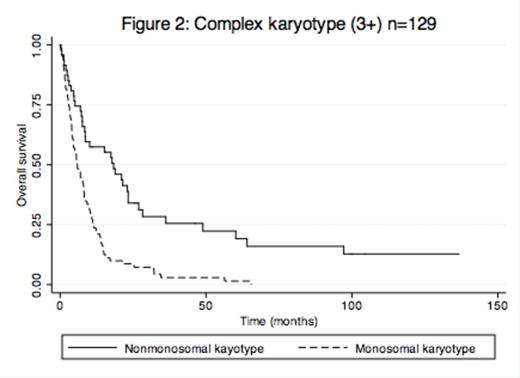Abstract
There are conflicting data on the impact of monosomal karyotype (MK) on overall survival (OS) in patients with myelodysplastic syndrome (MDS) and in particular whether MK is an independent predictor of survival in the subset of MDS patients with a complex karyotype (CK). We aimed to determine whether MK was associated with inferior survival independent of number of cytogenetic abnormalities.
Patients and data sources: A retrospective cohort study was performed using three population-based datasets from the Australian state of Victoria (population approximately 5.3 million). All incident cases of MDS notified to the Victorian Cancer Registry (VCR) from 2000 to 2010 were included. VCR data was linked with cytogenetic testing results performed by The Victorian Cancer Cytogenetic Service, the single provider of cytogenetic services for hematological malignancies in Victoria, and with hospital admission records held within the Victorian Admission Episode Database (VAED), a database of all hospital admissions within the state of Victoria. Cytogenetics: Metaphase cytogenetic analysis was performed according to standard techniques and karyotypes were described using the International System for Cytogenetic Nomenclature (ISCN). Statistical analysis: MK was defined as the presence of 2 or more autosomal monosomies or one monosomy with at least one additional structural abnormality. CK was defined as 3 or more cytogenetic abnormalities (CA). Overall survival (OS) was defined from date of diagnosis until death, censoring surviving patients at study end. OS was estimated using Kaplan-Meier curves, with survival between groups compared with the log rank test. Multivariable analysis was performed using the Cox proportional regression method, including all those variables associated with OS with a p-value less than 0.2 on univariate analysis.
1476 incident MDS cases notified to the VCR had cytogenetic testing performed. Metaphase cytogenetic testing was successful in 1407 cases (95%). The median age at diagnosis was 77 (interquartile range [IQR] 69-83) and 866 (62%) were male. The most common MDS subtypes were refractory anemia (RA) with multi-lineage dysplasia (n=482; 34%), RA with excess blasts (RAEB, n=243, 17%), RA (n=136, 9%), RA with ring sideroblasts (n=127, 9%) and not specified in 334 (24%). Hospital admission records were available for 1197 (85%), of whom 676 (56%) had one or more co-morbidity and 150 (12%) were red cell transfusion dependent (RC-TD) at diagnosis. 908 (65%) had a normal karyotype and 499 (34%) had at least one cytogenetic abnormality. CK was present in 129 (9%) and more than 5 CA in 96 (7%). MK was present in 90 (6%), of whom 82 (91%) also had CK and 74 (82%) also had 5 or more CA. Patients with a MK had worse overall survival compared to patients who did not have a MK (non-MK) (median OS 7 months vs. 41 months, Figure 1, p<0.001). Strikingly, MK was associated with worse survival than non-MK in patients with CK (median OS 6 months vs. 18 months, Figure 2, p<0.001) and in those with 5 or more CA (median OS 5 months vs. 9 months, p=0.0091, Figure 3). Variables included in the multivariable analysis were MDS subtype, age, sex, RC-TD, comorbidities, bone marrow blasts, MK, 5 or more CA, presence of monosomal 7 and/or monosomal 5, marker chromosomes and ring chromosomes. In multivariable analysis, stratified by MDS subtype, factors associated with worse survival were MK (hazard ratio [HR] 2.3, 95% CI 1.3 – 4.2, p=0.006), 5 or more CA (HR 2.4, 95% CI 1.4 – 3.9, p=0.001), aged 75 years or older (HR 2.1, 95% CI 1.6 – 2.7, p<0.001), RC-TD (HR 1.9, 95% CI 1.5 – 2.4, p<0.001), co-morbidity at diagnosis (HR 1.5, 95% CI 1.3 – 1.8, p <0.001) and bone marrow blasts more than 10% (HR 2.0, 95% CI 1.4 – 2.9, p<0.001).
In our representative cohort of MDS patients identified through population-level data sets from a large and well-defined population, MK is associated with worse OS in patients with MDS independent of the number of cytogenetic abnormalities. MK was one of the strongest predictors of survival in multivariable analysis and retained prognostic utility even in patients with CK where it was associated with an approximately 50% reduction in median survival. Thus, our data supports the clinical utility of MK as a predictor of adverse outcome in MDS.
Wood:CSL Behring: Research Funding.
Author notes
Asterisk with author names denotes non-ASH members.




This feature is available to Subscribers Only
Sign In or Create an Account Close Modal